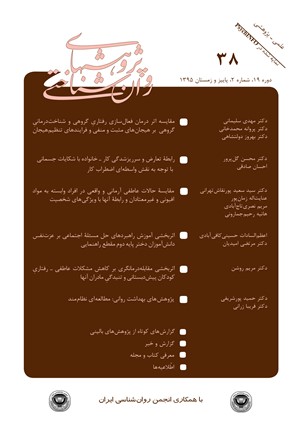اثربخشی مقابله درمانگری بر کاهش مشکلات عاطفی ـ رفتاریِ کودکان پیشدبستانی و تنیدگیِ مادران آنها
محورهای موضوعی :
1 - دانشگاه پیامنور تهران
کلید واژه: تنیدگی والدینی مشکلات عاطفی ـ رفتاری مقابلهدرمانگری ,
چکیده مقاله :
هدف پژوهش حاضر، بررسی تأثیر درمانِ مبتنی بر مقابلهدرمانگری بر پیشگیری از تنیدگی مادران و کاهش مشـکلات عـاطـفـی ـ رفتـاری کودکان پیشدبستانی است. جامعه آماری شامل کلیه کودکان 6-3 سالهای است که در پاییز 1393-1392، در شهرستان شاهیندژ، تحت آموزش در مهدکودکهای خصوصیِ زیر نظر سازمان بهزیستی بودند. مقیاس تنیدگی والدین در نمونة 200 نفری از مادران اجرا شد و 51 نفر از مادرانی که نمرههای بالایی در مقیاس تنیدگیِ والدینی داشتند به تصادف در دو گروه آزمـایشی (26 نفر) و کنتـرل (25 نفر) قـرار گـرفتند و به پرسشنامه مشکلات عاطفـی ـ رفتاری کودکان پـاسخ دادند. مادران گروه آزمایش در 12 جـلسه درمان مبتنی بر مقابلهدرمانگری شرکت کردند و سپس، از هر دو گروه پسآزمون گرفته شد. نتایج تحلیل کوواریانس نشان داد که مقابلهدرمانگری، در شاخص تنیدگی مادران در گروه آزمایش از نظر آماری کاهش معناداری پدید آورده است و کودکان گروه آزمایش از کودکان گروه کنترل، مشکلات عاطفی ـ رفتـاری کمتری نشان دادند.
Parenting stress affects children as a source of pressure. Involvement of parents in coping therapy designed to help their children, can reduce these negative outcomes. The aim of the present study was to examine the efficacy of coping therapy in reducing parenting stress and behavioral-emotional problems in children. To do so, The Parenting Stress Index (PSI) was administered on a sample of 200 mothers. Then 51 of those who scored highest in PSI were chosen and randomly assigned to the two experimenttal (N=26) and control (N=25) groups. Both groups completed the Strenghts and Difficulties Questionnaire. Quantative data were analyzed using pretest-posttest, correlation coefficient, and multiple covariance analyses. Results indicated that after intervention, mothers in the experimental group showed lower level of stress, as compared to mothers in control group. Children of mothers in experimental group showed less behavioral problems than children of mothers in the control group.

